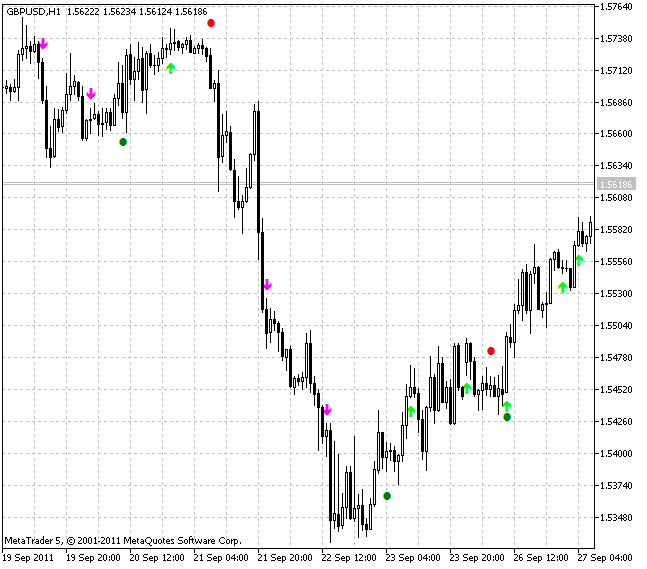Join our fan page
- Views:
- 8772
- Rating:
- Published:
- 2011.11.30 18:46
- Updated:
- 2023.03.29 13:43
-
Need a robot or indicator based on this code? Order it on Freelance Go to Freelance
This indicator provides alerts and signals for making deals using large colored dots and arrows on a chart.
The indicator is based on comparing the signals of JJRSX oscillator and XMA moving average working on different timeframes - the current (chart timeframe) and the higher ones respectively.
For the colored arrows XMA indicator trading signals from the higher timeframe are transferred, while trend reversal signals of JJRSX oscillator are transferred from the current timeframe. For colored dots trend reversal signals from XMA indicator are analyzed. Colored arrows are signals for the market entry, while colored dots are signals for the market exit.
For example, if the lime colored up arrow appears, then a long position must be opened. As soon as the red dot appears, this position must be closed. The same procedure is used for short positions, though the magenta arrow and the green dot are applied. It is possible to open and close positions by the signals from colored dots, while using colored arrows for adding to already existing positions.
Smoothing algorithm can be changed for XMA moving average:
- SMA - simple moving average;
- EMA - exponential moving average;
- SMMA - smoothed moving average;
- LWMA - linear weighted moving average;
- JJMA - JMA adaptive average;
- JurX - ultralinear smoothing;
- ParMA - parabolic smoothing;
- T3 - Tillson's multiple exponential smoothing;
- VIDYA - smoothing with the use of Tushar Chande's algorithm;
- AMA - smoothing with the use of Perry Kaufman's algorithm.
It should be noted that Phase parameter has completely different meaning for different smoothing algorithms. For JMA it is an external Phase variable changing from -100 to +100. For T3 it is a smoothing ratio multiplied by 100 for better visualization, for VIDYA it is a CMO oscillator period and for AMA it is a slow EMA period. In other algorithms these parameters do not affect smoothing. For AMA fast EMA period is a fixed value and is equal to 2 by default. The ratio of raising to the power is also equal to 2 for AMA.
Compiled files of XMA and JJRSX indicators must be placed to the terminal_data_folder\MQL5\Indicators\. The indicators use SmoothAlgorithms.mqh library classes (must be copied to the terminal_data_folder\MQL5\Include). The use of the classes was thoroughly described in the article "Averaging Price Series for Intermediate Calculations Without Using Additional Buffers".

Indicator input parameters:
Indicator input parameters are divided into three groups. Display parameters of the indicator itself, XMA and JJRSX indicators parameters:
//+-------------------------------------+ //| Indicator input parameters | //+-------------------------------------+ input uint SignalLableShift=100; // Entries vertical shift input uint StopLableShift=300; // Stops vertical shift input uint AlertCount=0; // Number of submitted alerts input uint SignalBar=1; // Signal bar index, 0 is a current bar //+-------------------------------------+ //| XMA indicator input parameters | //+-------------------------------------+ input ENUM_TIMEFRAMES TimeFrame_XMA=PERIOD_H4;// XMA chart period input Smooth_Method MA_Method_XMA=MODE_T3; // XMA averaging method input int Length_XMA=12; // XMA smoothing depth input int Phase_XMA=15; // XMA smoothing parameter [-100...+100] input Applied_price_ IPC_XMA=PRICE_CLOSE; // XMA applied price //+-------------------------------------+ //| JJRSX indicator input parameters | //+-------------------------------------+ input int Length_JJRSX=8; // JJRSX smoothing depth input int Smooth_JJRSX = 8; // JJRSX averaging JJMA depth input int Phase_JJRSX = 100; // JJRSX averaging JJMA parameter [-100..+100] input Applied_price_ IPC_JJRSX=PRICE_CLOSE_; // JJRSX applied price
Translated from Russian by MetaQuotes Ltd.
Original code: https://www.mql5.com/ru/code/574
 JFatlAcceleration_HTF
JFatlAcceleration_HTF
This indicator shows the direction of the acceleration of JFatlAcceleration price from a larger timeframe at a smaller one.
 Two-Pole Super Smoother Filter
Two-Pole Super Smoother Filter
Two-pole super smoother filter from John Ehlers' book "Cybernetic Analysis for Stocks and Futures: Cutting-Edge DSP Technology to Improve Your Trading" is used in this indicator for moving average calculation.
 XADX
XADX
More informative Average Directional Index (ADX) indicator with the possibility to select the smoothing algorithm out of ten possible variants.
 LinearRegSlope V2
LinearRegSlope V2
Moving average with the linear regression algorithm.